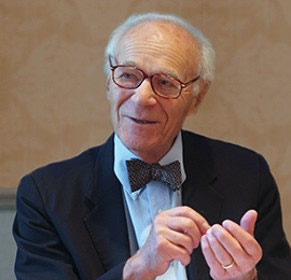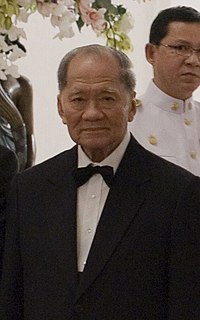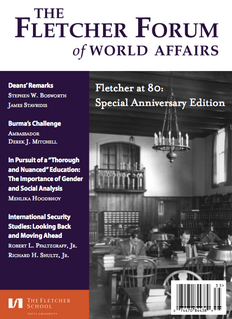Related Research Articles

The Communist Party of China (CPC) is the founding and ruling political party of the People's Republic of China (PRC) and the second largest political party in the world. The CPC is the sole governing party within mainland China, permitting only eight other, subordinated parties to co-exist, those making up the United Front. It was founded in 1921, chiefly by Chen Duxiu and Li Dazhao. The party grew quickly, and by 1949 it had driven the Kuomintang (KMT)'s Nationalist Government from mainland China to Taiwan after the Chinese Civil War, leading to the establishment of the People's Republic of China. It also controls the country's armed forces, the People's Liberation Army.

Deng Xiaoping was a Chinese politician who was the paramount leader of the People's Republic of China from 1978 until his retirement in 1992. After Chairman Mao Zedong's death in 1976, Deng gradually rose to power and led China through a series of far-reaching market-economy reforms, which earned him the reputation as the "Architect of Modern China."
Maoism, or Mao Zedong Thought, is a variety of Marxism–Leninism that Mao Zedong developed for realising a socialist revolution in the agricultural, pre-industrial society of the Republic of China and later the People's Republic of China. The philosophical difference between Maoism and Marxism–Leninism is that the peasantry are the revolutionary vanguard in pre-industrial societies rather than the proletariat. This updating and adaptation of Marxism–Leninism to Chinese conditions in which revolutionary praxis is primary and ideological orthodoxy is secondary represents urban Marxism–Leninism adapted to pre-industrial China. The claim that Mao Zedong had adapted Marxism–Leninism to Chinese conditions evolved into the idea that he had updated it in a fundamental way applying to the world as a whole.

International relations (IR) or international affairs (IA)—commonly also referred to as international studies (IS), global studies (GS), or global affairs (GA)—is the study in interconnectedness of politics, economics and law on a global level. Depending on the academic institution, it is either a field of political science, an interdisciplinary academic field similar to global studies, or an entirely independent academic discipline in which students take a variety of internationally focused courses in social science and humanities disciplines. In all cases, the field studies relationships between political entities (polities) such as sovereign states, inter-governmental organizations (IGOs), international non-governmental organizations (INGOs), other non-governmental organizations (NGOs), and multinational corporations (MNCs), and the wider world-systems produced by this interaction. International relations is an academic and a public policy field, and so can be positive and normative, because it analyses and formulates the foreign policy of a given state.

Lawrence Robert Klein was an American economist. For his work in creating computer models to forecast economic trends in the field of econometrics in the Department of Economics at the University of Pennsylvania, he was awarded the Nobel Memorial Prize in Economic Sciences in 1980 specifically "for the creation of econometric models and their application to the analysis of economic fluctuations and economic policies." Due to his efforts, such models have become widespread among economists. Harvard University professor Martin Feldstein told the Wall Street Journal that Klein "was the first to create the statistical models that embodied Keynesian economics," tools still used by the Federal Reserve Bank and other central banks.
Otto Eckstein was a German-American economist. He was a key developer and proponent of the theory of core inflation, which proposed that in determining accurate metrics of long run inflation, the transitory price changes of items subject to volatile pricing, such as food and energy, are to be excluded from computation.

The Sino-Soviet split (1956–1966) was the breaking of political relations between the People's Republic of China (PRC) and the Union of Soviet Socialist Republics (USSR), caused by doctrinal divergences that arose from their different interpretations and practical applications of Marxism–Leninism, as influenced by their respective geopolitics during the Cold War (1945–1991). In the late 1950s and early 1960s, Sino–Soviet debates about the interpretation of orthodox Marxism became specific disputes about the USSR's policies of national de-Stalinization and international peaceful coexistence with the Western world, which Mao decried as Marxist revisionism. Against that ideological background, China took a belligerent stance towards the West, and publicly rejected the USSR's policy of peaceful coexistence between the Eastern bloc and the Western bloc. In addition, China resented the closer Soviet ties with India, and Moscow feared Mao was too nonchalant about the horrors of nuclear war.

Kriangsak Chamanan served as prime minister of Thailand from 1977 to 1980. After staging a successful coup, he was asked to become Prime Minister in 1977, he ruled till 1980 and is credited with "steering Thailand to democracy" in a time where internally, communist insurgents are rampant and neighbouring countries have turned to communist rule following the communist takeover of Vietnam: South Vietnam, Laos, and Cambodia. He died on 23 December 2003, aged 86.
The Institute of Pacific Relations (IPR) was an international NGO established in 1925 to provide a forum for discussion of problems and relations between nations of the Pacific Rim. The International Secretariat, the center of most IPR activity over the years, consisted of professional staff members who recommended policy to the Pacific Council and administered the international program. The various national councils were responsible for national, regional and local programming. Most participants were elite members of the business and academic communities in their respective countries. Funding came largely from businesses and philanthropies, especially the Rockefeller Foundation. IPR international headquarters were in Honolulu until the early 1930s when they were moved to New York and the American Council emerged as the dominant national council.

Thanin Kraivichien is a Thai former judge, politician and law professor. He was the prime minister of Thailand between 1976 and 1977. Subsequently, he was a member of the Privy Council until 2016.

Grzegorz Witold Kołodko is a distinguished professor of economics. A key architect of Polish economic reforms. He is the author of New Pragmatism original paradigmatic and heterodox theory of economics. University lecturer, researcher, the author of numerous academic books and research papers. As Polish Deputy Premier and Minister of Finance in 2002-03 he played a leading role in achieving the entry of Poland into the European Union. Holding the same position in 1994-97, Kolodko led Poland to the OECD. The founder and Director of TIGER – Transformation, Integration and Globalization Economic Research at the Kozminski University in Warsaw. Consultant to such international organizations as the IMF, World Bank, UN, and the OECD. Member of the European Academy of Arts, Sciences and Humanities, Member of Academia Europaea. Foreign Member of Russian Academy of Sciences. Honorary Chairman of China's Public Diplomacy Institute and a Non-resident Senior Fellow, Chongyang Institute for Financial Studies, Renmin University of China, Beijing, Professor HUST, Huangzhou University of Science and Technology, Wuhan; Distinguished Professor of Emerging Markets Institute, Beijing Normal University, Beijing.
Harold J. Noah was an American educator, whose research and writing have focused on comparative education and economics of education. He was born in London, England and moved to the United States in 1958. His higher education began at the London School of Economics and King’s College, University of London, and was followed by a Ph.D. at Teachers College, Columbia University. He served as Professor at Teachers College, Columbia, from 1964 to 1987. He was appointed to the Gardner Cowles chair in economics of education. He served as Dean of the College from 1976 to 1981. He is widely recognized as a distinguished authority in the field of comparative education.
Alexander Nove, FRSE, FBA was a Professor of Economics at the University of Glasgow and a noted authority on Russian and Soviet economic history. According to Ian D. Thatcher, "[T]he consensus is that he was one of the most significant scholars of 'Soviet' studies in its widest sense and beyond."
George William Skinner was an American anthropologist and scholar of China. Skinner was a proponent of the spatial approach to Chinese history, as explained in his Presidential Address to the Association for Asian Studies in 1984. He often referred to his approach as "regional analysis," and taught the use of maps as a key class of data in ethnography.

The National Committee on United States China Relations (NCUSCR) is a nonprofit organization and advisory body founded in 1966. It encourages understanding and cooperation between the United States and China.
Albert Feuerwerker was a historian of modern China specializing in economic history and long time member of the University of Michigan faculty. He was the president of the Association for Asian Studies in 1991.

The Fletcher Forum of World Affairs is a biannual peer-reviewed academic journal of international relations established in 1975. It is managed by students at The Fletcher School of Law and Diplomacy. It is also an online foreign policy forum with additional articles and interviews.
Rhoads Murphey was a geographer and historian of Asia who taught at University of Washington, Seattle, and University of Michigan, Ann Arbor. He served for many years as executive director of the Association for Asian Studies, and in 1987-88 as its president, He was editor of the Journal of Asian Studies.
The Vietnam Economic and Cultural Office in Taipei is the representative office of Vietnam in Taiwan, which functions as a de facto embassy in the absence of diplomatic relations. Its counterpart body in Vietnam is the Taipei Economic and Cultural Office in Vietnam based in Hanoi.

Soviet Union-Africa relations covers the diplomatic, political, military and cultural relationships between the Soviet Union and Africa, from the 1945 to 1992. Joseph Stalin made Africa a very low priority, and discouraged relationships or studies of the continent. However the decolonization process of the 1950s and early 1960s opened new opportunities, which Soviet leader Nikita Khrushchev was eager to exploit. The Kremlin developed four major long-term policy goals: 1) To gain a lasting presence on the continent. 2) To gain a voice in African affairs. 3) To undermine Western/NATO influence, especially by identifying capitalism with Western imperialism. 4) After 1962, it fought hard to prevent communist China from developing its own countervailing presence. At no time was Moscow willing to engage in combat in Africa, although its ally Cuba did so. Indeed the Kremlin at first assumed that the Russian model of socialized development would prove attractive to Africans eager to modernize. That did not happen, and instead the Soviets emphasized identifying likely allies and giving them financial aid and munitions, as well as credits to purchase from the Soviet bloc. Although some countries, such as Angola and Ethiopia, became allies for a while, the connections proved temporary. With the collapse of the Soviet Union in 1991, Russian influence greatly diminished.
References
- ↑ Feuerwerker, A., Oksenberg, M., Dernberger, R. and Whiting, A., (1977). Alexander Eckstein 1915-1976. The Journal of Asian Studies, 37(1), p.87.